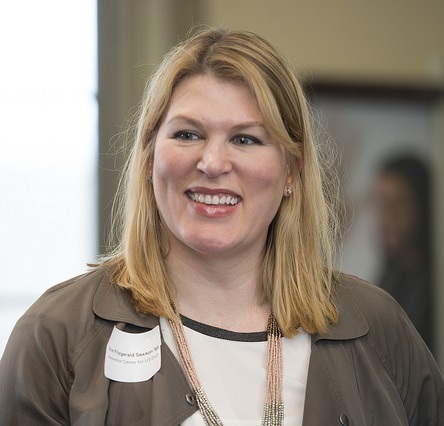
On Monday, the White House honored 12 Champions of Change for Sustainable and Climate-Smart Agriculture who are implementing practices to reduce greenhouse gas emissions and improve environmental conditions while sustaining local economies. One of these Champions is Notre Dame alumna Erin Fitzgerald Sexson '99.
Erin is Senior Vice President of Global Sustainability at Innovation Center for U.S. Dairy. "I am humbled to be recognized as a Champion of Change in Agriculture, but the true champions are the American dairy farmers I am privileged to work for every day," said Erin. "When we set out on our sustainability journey eight years ago, farmers taught me two valuable lessons. The first thing I learned is that words can create worlds. The word “sustainability” is typically defined as the ability to maximize for a “triple bottom line” which balances economic, environmental and social considerations. Our farmers taught us that the concept should also include stewardship. Stewardship is the commitment to care for and pass the land on to the next generation in better shape than we found it. Sustainability, then, is about putting that commitment to work every day so that our businesses, communities and people can prosper. Today, putting this commitment to work is more important than ever."
"Farmers often say “get your boots dirty” and that points to the second valuable lesson that I learned from them: how to walk in someone else's shoes and see the world from their perspective," she added "That inspired an amazing collaboration among dairy farmers, scientists, academics, dairy companies, brands, retailers, government and non-governmental agencies as we worked together toward common goals. Sustainability is inherently interdisciplinary and necessitates diverse thinking. This contagious collaboration will help us solve for the unprecedented challenges agriculture faces in the 21st century and beyond."
In panel discussions at the White House, the Champions shared the techniques they are using on their farm such as planting cover crops, practicing no-till, installing biodigestors, and optimizing nutrient application. The Champions all recognize the important role that our nation’s farmers, ranchers, and agricultural educators can play in addressing climate change. Their actions build on the U.S. Department of Agriculture’s strategy, released in April 2015, to reduce net emissions and enhance carbon sequestration from agricultural and forestry practices by over 120 million metric tons of CO2 equivalent by 2025.
In addition to the panel discussion, the Champions had an opportunity to tour the White House Garden which planted cover crops this week as a demonstration of the importance of these actions in improving soil quality, reducing erosion, and increasing soil carbon. In recognition of the importance of sustainable practice, the White House announced that it will plant cover crops in the White House Kitchen Garden this week to improve soil quality, reduce erosion and increase soil carbon.
Excerpted from an article by Angela Barranco at www.whitehouse.gov.